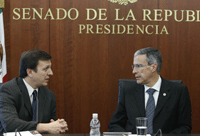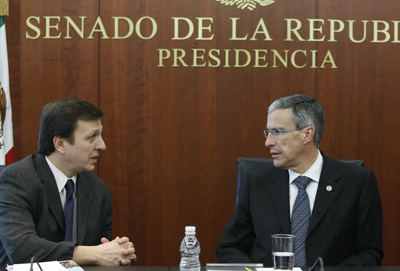News from the Committee to Protect Journalists, March 2012
Landmark legislation in Mexico

After years of advocacy by CPJ and other press freedom groups, Mexico’s senate finally approved legislation ensuring the punishment of anti-press crimes. Mexican President Felipe Calderón had promised a CPJ delegation in 2008 and again in 2010 that he would get the measure implemented, and on March 13, the legislation was passed.
The achievement–which gives federal authorities jurisdiction over crimes against “journalists, people, or outlets that affects, limits, or impinges upon the right to information and freedom of expression and the press”–should go a long way toward bringing justice for the more than 40 Mexican journalists killed since 2006.
During the passing of the bill on the senate floor, CPJ’s Mexico representative, Mike O’Connor, was lauded by the senate for CPJ’s contribution to making the law a reality. This heartening victory, however, does not signify a defeat of impunity. It is only one step toward bringing to justice the killers of Mexican journalists who must be tried and sentenced.
Press targeted by Syrian government
CPJ issued a report on the anniversary of the Syrian uprising that documented eight local and international journalists killed on duty in the country since November 2011. Findings from the report pointed to substantial evidence that two local journalists, Ferzat Jarban and Basil al-Sayed, were directly targeted by government forces. Circumstantial evidence and witness statements pointed to the possibility that government forces may have taken deliberate, hostile action against the press that led to the deaths of international journalists Gilles Jacquier, Marie Colvin, and Rémi Ochlik.
CPJ’s call for the end of journalist murders in Syria was met with support from the International Commission of Inquiry for Syria, appointed by the U.N. Human Rights Council to investigate rights violations in the country from March 2011. Paulo Pinheiro, head of the commission, referred to CPJ’s report on journalists killed in the country when criticizing Syrian policy. Our research shows that Syria has the highest number of journalist deaths of any country swept by the Arab revolutions.
CPJ advocacy draws response from Liberian government
After journalist Mae Azango received threats for reporting on the practice of female genital mutilation in Liberia, CPJ publicized the story worldwide, drawing attention to the dangers she faced. The urgency of Azango’s story also prompted CPJ to initiate a social media campaign to pressure President Ellen Johnson Sirleaf’s government into taking action in her case.
CPJ wrote a letter to Sirleaf, asking that authorities ensure Azango’s safety. The Liberian government issued a public statement in response, condemning “intolerance whose objective is to stifle the exercise of individual freedoms and to frustrate the advance of civil liberties.” Azango remains under threat in Liberia, and CPJ is continuing to advocate on her behalf.
Guinean officials apologize to assaulted journalist
CPJ’s coverage of an assault by Guinean police on a journalist led to a public apology by officials. Kounkou Mara was attempting to interview the head of a bank when Guinean police deemed her a security threat and pushed and shoved her outside, injuring her in the process. In the apology, officials said they recognized the mistake committed by its police officers and asked Mara to forgive their actions.
Journalist Assistance supports Egyptian reporter
In November 2011, Ahmed Fiqqi, an Egyptian radio reporter for the independent media organization Hoqook, was struck in his eye by a bullet while covering political unrest in Cairo. After Fiqqi received financial assistance for two surgeries from a regional press freedom group, CPJ’s Journalist Assistance program provided him with support for his rehabilitation and the follow-up surgeries meant to restore his vision and the shape of his eye.
Last year, CPJ documented dozens of attacks on the press during clashes between protesters and security forces in central Cairo.
Upcoming Events
In April, CPJ will release the new Journalist Security Guide, which will offer guidelines for basic preparedness and advice on complex issues such as digital security and threat assessment. The guide, geared toward journalists around the world, will be available in Arabic, English, and Spanish.
Check our events section for other upcoming events.
Donate
CPJ’s Distress Fund provides emergency grants to journalists facing persecution for their work. Support our work and give a gift today.
Blog highlights
With coup, quiet #Mali generates noise on Twitter
As Chinese politician is censored, exiled journalist triumphs
From Small World timely advice on satphone use
Pakistan’s excessive internet censorship plans
